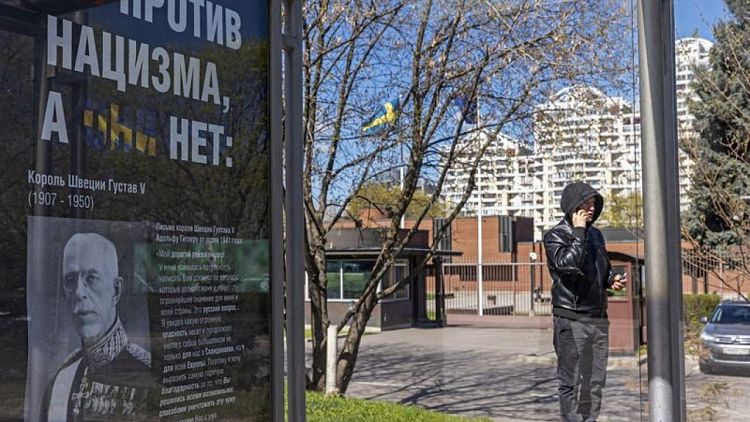- Posters accusing some of the 20th century's most famous Swedes of supporting Nazism have appeared on Moscow's streets in a sign of worsening relations between Russia and Sweden as the Nordic country contemplates joining NATO.
Outside the Swedish embassy two posters affixed to a bus stop featured photographs of Swedish King Gustaf V, writer Astrid Lindgren, film director Ingmar Bergman and IKEA founder Ingvar Kamprad, and the message: "We are against Nazism, they are not."
Reuters saw a third poster featuring the Swedish figures, all of whom are now dead, on a major thoroughfare in central Moscow.
Asked about the posters, the press office of Sweden's foreign ministry said in a statement: "Sweden has no intention of engaging in a public polemic with the Russian organisation 'Our Victory', which is reportedly behind these posters."
"In Russia, accusations of 'Nazism' have repeatedly been deployed against countries and individuals who express justifiable criticism of Russia's actions," it added.
The Russian foreign ministry did not respond to a request for comment.
Three Moscow commuters at the embassy bus stop told Reuters they were in favour of the anti-Swedish posters.
"I think the posters are timely in light of recent events," said 47-year-old Alexandra. "If Europeans consider themselves democratic countries, then I think it's entirely democratic to express an alternative point of view and show people a different opinion."
Russia's annexation of Crimea in 2014 and its invasion of Ukraine on Feb. 24 have prompted Sweden and its neighbour Finland to rethink their security policies, with NATO membership looking increasingly likely.
Sweden's defence minister said last month that a NATO application could trigger a number of responses from Russia, including cyber attacks and hybrid measures such as propaganda campaigns.
Moscow says its military campaign in Ukraine is designed to demilitarize and "denazify" the country, something Kyiv and the West have dismissed as a baseless pretext to wage an unprovoked war of aggression against a sovereign democratic state.
